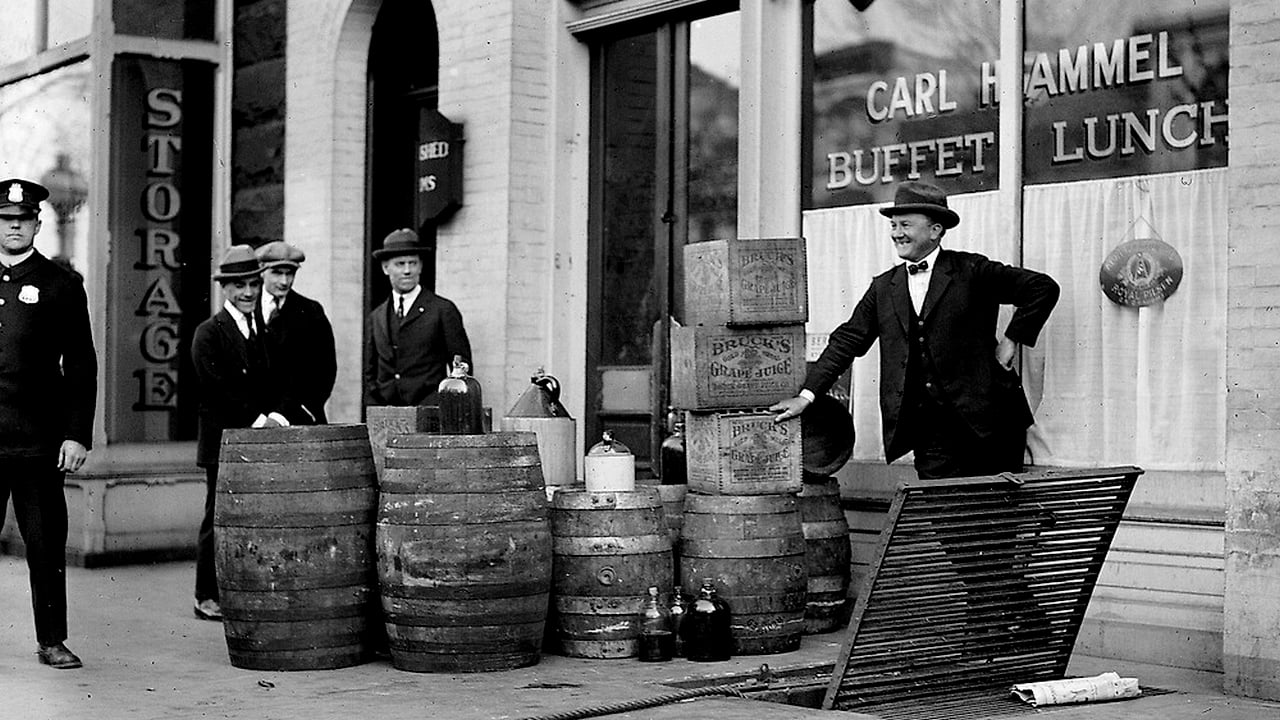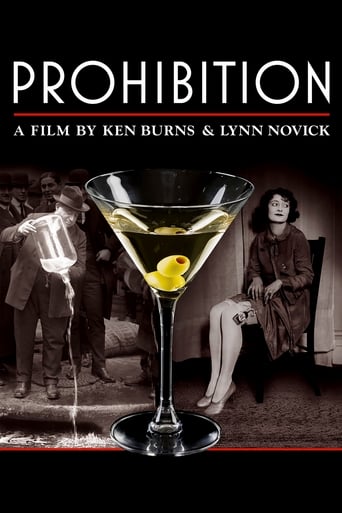

I really don't get the hype.
... View Moreeverything you have heard about this movie is true.
... View MoreClever and entertaining enough to recommend even to members of the 1%
... View MoreThe thing I enjoyed most about the film is the fact that it doesn't shy away from being a super-sized-cliche;
... View MoreWas hoping to hear more about the Kennedy clan and their bootlegging activities. Kennedys as a topic were largely avoided for whatever reason. Also, I'm not sure I agree with some of the conclusions of the commentators. When we make alcohol legal, we make a form of temporary insanity legal. How can people be then be held legally accountable for their actions while inebriated when this is legally permissible? How can we measure the health care burden on society at large and the increased insurance premiums we all have to shoulder as a result of the legalization of something that is addictive and fundamentally bad for us? I think the conclusions of this documentary were entirely too one sided and somewhat simplistic.
... View MoreThis is the latest documentary series from Ken Burns--the docu-god for Public Broadcasting. Not surprisingly, with his amazing reputation for perfection, he was able to once again get many of America's top actors to provide their voice talents to the shows--such as Tom Hanks, Sam Waterston and Blythe Danner. And, like so many PBS documentaries, Peter Coyote narrates more than capably.The miniseries consists of three episodes. The first is about the background leading to Prohibition--the temperance movement and problems with alcohol over-consumption. It also ends with the implementation of the Constitutional Amendment. Part Two is about the practical aspects of the law. The difficulty in enforcement is due to a lack of widespread support, loopholes in the law as well as the way the law actually ENCOURAGED the growth of organized crime. Part Three is about the rising dislike of the law that led to its repeal.Overall, it's yet another very good series by Ken Burn and is among the best shows you can find on the topic. Well worth your time--and it manages to make an educational show fun...of sorts.
... View MoreMy favorite comment in this documentary is offered by Pete Hamill, American journalist, novelist and essayist, who said basically if you want people to brush their teeth, pass a law banning toothpaste. And then people will do everything they can to acquire toothpaste illegally, and they'll brush their teeth just to spite the law. The unforeseen consequence of Prohibition is that once you take away a person's right to do something that people have always done, people will feel the desire to want it much more intensely, in the same way if you deny a child all sweets, the kid will be sneaking chocolate inside his jacket sleeves. Hamill later says he doesn't drink, but he would probably take a swig in front of a government building if the law ever forbade him from doing it. Encouraging moderation is not the same as banning something completely.The other comment worth noting concerns repeal crusader Pauline Sabin who had been entrenched in republican politics prior to 1928. Republican congressmen would vote to adhere to the strictest of prohibition laws as laid out by the Volstead Act and then go to one of Sabin's parties demanding a drink. She concluded that the United States had become "a Nation of Hypocrites", which is the title of the third installment of Burn's documentary. Sabin becomes an unlikely hero who would sway the country against Prohibition and the eventual repeal of the 18th Amendment of the Constitution, the only amendment so dignified. Ironically, Daniel Okrent points out that today alcohol is somewhat harder to come by than during Prohibition because of liquor laws, underage drinking laws, etc. When alcohol was strictly forbidden, there was nothing in place to regulate it, except for raids on speakeasies and private distilleries.Based in part on Daniel Okrent's "Last Call: The Rise and Fall of Prohibition", Ken Burns and Lynn Novick's "Prohibition" is a thoroughly entertaining, simultaneously humorous and "sobering" look at one of the strangest episodes in American legal history. The documentary is in three parts, the first chronicling the birth of the temperance movement which began in the 1820's almost a century before the ratification of the 18th Amendment. No question that alcohol was a problem for some people, mostly among the rural poor, but the temperance movement decided alcohol itself was the problem and vowed its eradication by the late 19th century. The first part ends with the ratification of the 18th Amendment to the US Constitution prohibiting not only the sale but importation of alcohol. Part two concerns the passage of the Volstead Act designed to enforce the amendment, and the immediate consequences of trying to stop people from drinking, and the antithetical results, such as lawlessness and bribery. The third and most sobering of the episodes chronicles many of the unintended consequences, such as the violence erupting in Chicago and the night club craze. The documentary ends with the movement for the repeal of the 18th Amendment.The unforeseen catastrophes of the 18th Amendment which were designed to heighten American morality and assuage drunkenness turned America into one of the most alcoholic-driven nations among the industrialized world. Americans drank more booze, partied more, got more drunk, and flaunted the law more often during Prohibition than at any other time in the nation's history since after the Civil War, even as compared to the present time. Possibly only the 1960's are somewhat comparable to the mayhem of the 1920's.The irony of ironies that the decade begun by the Temperance Movement's victory with the passage of the 18th Amendment to the US Constitution in 1919 would be nicknamed the Roarding Twenties and the Jazz Age. This was not a decade known for drinking milk. This was a decade characterized by cocktail glasses in the hands of flappers dancing on tables to the evocative music of Duke Ellington and Count Basie. Men would be raising giant mugs of frothy beer in underground establishments called speakeasies. Only Prohibition allowed the likes of Al Capone and Lucky Luciano to become wealthy gangsters, almost movie stars by today's standards. The leaders of the Temperance Movement, particularly the Woman's Christian Temperance Union and the Anti-Saloon League, were appalled when their daughters ran off to speakeasies and night clubs to partake of the forbidden fruit. Strangely, Prohibition helped usher in the Night Club culture of America which has continued unabated ever since. All the great night clubs famous for their booze, music, and dancing such as the Cotton Club and the Stork Club, were incepted when alcohol was supposed to be illegal.For some reason, I didn't think Prohibition permeated into so many aspects of American life during its enforcement from 1920 through 1932. People could open small businesses in their basements and make a fortune through bootlegging, and then be hauled away under the Volstead Act. The rise of the Chicago Gang syndicate became a prototype for similar syndicates across the country, all vying for their bootlegging territory. At one point, citizens were legally compelled to snitch on neighbors suspected of bootlegging. The story as presented by Burns/Novick is as compelling as any action thriller being produced today. A great movie of American history, with all the elements that make a great story. Essentially it's a legal thriller with sex, violence, and lots of booze. Lots of it.
... View MoreI just finished watching this 3-part series on PBS. It is timely to add comments because this is such a fascinating film.I grew up mostly in the 1950s and 1960s, and as a young adult was aware of the "prohibition era" but really knew nothing about it. Seeing this film puts lots of things into perspective.On the one hand, the concerns about alcohol consumption were, and still are, real. What the film shows so clearly is that the "solutions" didn't solve anything, plus many new problems were created. A new criminal enterprise was spawned, and there simply were not enough law enforcement people to monitor, arrest, and try those in the booze smuggling business. It was doomed to failure, and we are better off today as a result.As history now witnesses, prohibition failed. It was replaced by laws which, instead of making production and sale of alcoholic beverages illegal, make it illegal to be drunk in public or perform certain activities while under the influence. Which should have been the approach all along.I can't help thinking of prohibition alongside the current Tea Party movement. While both of them have certain admirable goals, in both cases you can't charge ahead with a tunnel vision that neglects all the other things that will be impacted.
... View More